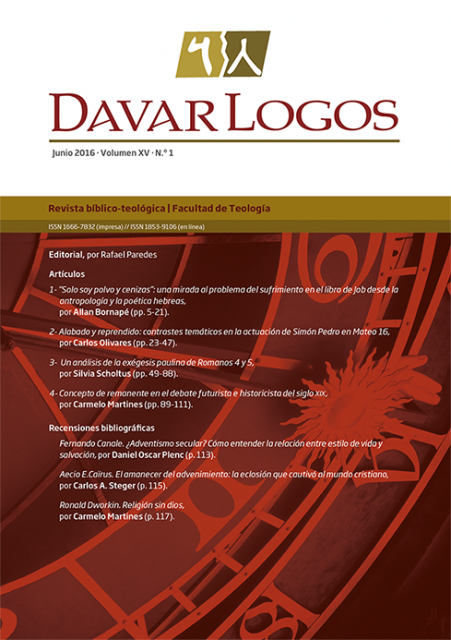“Solo soy polvo y cenizas”: una mirada al problema del sufrimiento en el libro de Job desde la antropología y la poética hebreas
Palabras clave:
Sufrimiento – Teología del conflicto – Antropología – Emociones – PoéticaResumen
Resumen
El libro de Job es, sin duda, la obra literaria que más comentarios ha suscitado sobre el problema del sufrimiento en la existencia humana. Sin embargo, no se ha profundizado suficiente en la riqueza expresiva con que se describe al hombre y su relación con el problema del mal. Por ello es que en la presente investigación se desea reflexionar sobre el tema del sufrimiento humano en el libro de Job de acuerdo con la propia visión del libro, con base en la antropología hebrea clásica, comenzando con (1) algunas consideraciones lingüísticas sobre la descripción del cuerpo en la expresión de las emociones en la Biblia hebrea; (2) un estudio similar en el libro de Job y en parte de su rico vocabulario antropológico en la descripción de las experiencias del dolor y el sufrimiento, especialmente según el poema del capítulo 3; y por último, (3) los alcances de la concepción antropológica del libro de Job y su expresión poética en todo el libro con el fin de establecer cuidadosamente un puente entre presente y pasado ( Job y nosotros), entre la figura humana de Job y nuestra experiencia cotidiana del sufrimiento.
Abstract
The book of Job is, undoubtedly, the literary work that has provoked more comments regarding the issue of suffering in human existence. However, the expressive richness with which men is described, and his relationship with evil, has not been delved in enough. This is why this research intends to reflect on the issue of human suffering in the book of Job, in accordance with the book´s own vision, based on the classic Hebrew anthropology, and beginning with (1) some linguistic considerations regarding the description of the body in the expression of emotions in the Hebrew Bible; (2) a similar study on the book of Job and in part of its rich anthropological vocabulary in the description of the experiences of pain and suffering, especially according to the poem of chapter 3; and, lastly, (3) the scopes of the anthropological conception of the book of Job and its poetic expression in the entire book, with the objective of carefully establishing a bridge between the present and the past ( Job and us), between the human figure of Job and out daily experience of suffering.
Descargas
Descargas
Publicado
Número
Sección
Licencia

Esta obra está bajo una licencia internacional Creative Commons Atribución-NoComercial-CompartirIgual 4.0.





